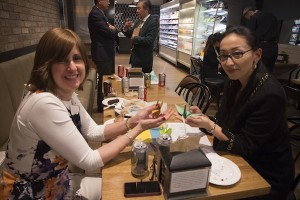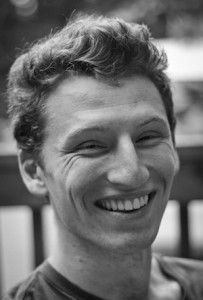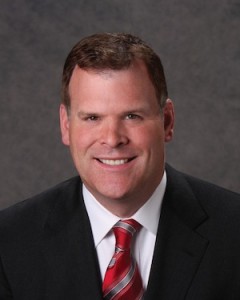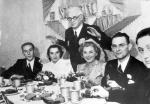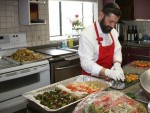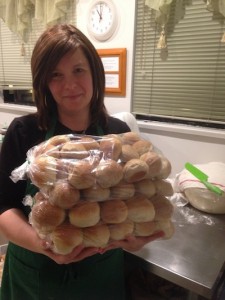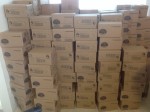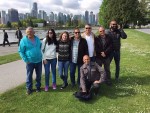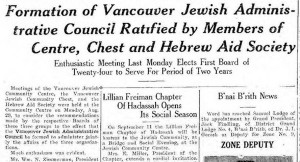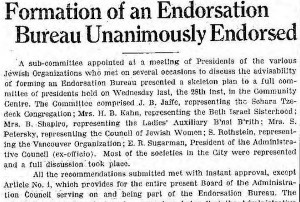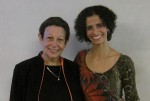Dr. Adele Diamond, left, with Dr. Rania Okby at a Canadian Associates of Ben-Gurion University-hosted event at the University of British Columbia, in which Okby discussed some of the health challenges facing the Bedouin in Israel. (photo by Cynthia Ramsay)
Next week, Adele Diamond, professor of developmental cognitive neuroscience at the University of British Columbia, will be presented with an honorary doctorate from Ben-Gurion University. The professor spoke with the Jewish Independent at her lab on the UBC campus.
Born in New York City, Diamond’s academic career took root at Harvard, where she studied anthropology, sociology and psychology, but was not yet interested in the brain. After she decided to retire her first thesis idea, she was inspired to take a closer look at brain development in babies.
“My first year in graduate school, my advisor [Jerome] Kagan was jumping up and down about all the changes you see in babies’ behavior in the first year of life. No matter where they are in the world, whether they’re in kibbutzim, in nuclear families, they’re in Africa, they’re in Asia, it doesn’t matter. You see the same cognitive changes at basically the same time during the first year. He said, ‘It can’t all be learning and experience, their experiences are too different. There has to be a maturational component [in the brain].’ He was so excited about this, you couldn’t help but be excited,” she said.
Today, Diamond’s lab seeks to understand how children’s minds and brains develop. Specifically, she studies an area called the prefrontal cortex (PFC) and the cognitive abilities that depend on it, known as executive functions (EFs).
In a 2011 paper, Diamond describes the critical role of EFs. “To be successful takes creativity, flexibility, self-control and discipline. Central to all those are executive functions,” including cognitive flexibility (thinking outside the box, perspective taking), working memory (mentally relating different ideas and facts to one another) and inhibitory control. Other EFs that depend on these three building blocks include mental reasoning, creative problem solving, planning and execution.
EFs can be lacking in children who have behavioral, neurological and developmental disorders and are compromised in kids diagnosed with attention deficit disorders and autisms. The PFC is also influenced by environmental factors, compromising EF in kids experiencing poverty and other disadvantages and stressors. Fortunately, there are interventions that have been found to be successful, especially when implemented in early childhood.
“Traditional activities that have been part of all cultures throughout time (e.g., dance, music-making, play and sports) address all these aspects of a person – they challenge our EFs (requiring focus, concentration and working memory), make us happy and proud, provide a sense of belonging and help our bodies develop,” the lab’s website explains. Importantly, Diamond’s lab has “documented marked advances in executive functions due to an early childhood school curriculum (Tools of the Mind) that requires no specialists or expensive equipment, just regular teachers in regular classrooms. The children who spent more time in social pretend play outperformed their peers who received more direct academic instruction.”
She explained in a 2007 paper, “Brain-based doesn’t mean immutable or unchangeable. EFs depend on the brain, yet exercising and challenging EFs improves them, much as physical exercise hones our physical fitness. Yet, transfer is never wide; to get diverse benefits, diverse skills must be directly trained and practised.”
There is a deep connection between mental health and EF and it’s not just depression and anxiety that have a negative impact – sadness and loneliness also correlate with compromised EFs. “Prefrontal cortex and executive functions are kind of the canary in the coal mine. So, if anything isn’t right in your life, it’s going to hit prefrontal executive functions first and most,” she said. “So, if you’re sad, if you’re lonely, if you’re troubled, if you’re not physically fit, if you’re not getting enough sleep, if you don’t feel socially supported, if you feel ostracized, any of those things, it’s going to impair executive functions. A lot of people notice that when they’re feeling stressed or down for whatever reason they can’t think as clearly or exercise as good self-control – and that’s not just your perception, it’s really true … the phenomenological experience is credible.
“There are a lot of technical reasons why that’s true for prefrontal in the neurochemistry. That’s one of the reasons I argue that we have to care about the whole child. We can’t say school is just about the cognitive, because if the child is sad, if the child is stressed, if the child is lonely, the child’s not physically fit, the child isn’t going to be able to do as well academically as the child would otherwise be able to do. The child can’t show the academic potential he actually has.”
“If you step in right away when the kids disagree then they don’t have the chance to work it out among themselves…. I think a lot of kids don’t have that now. Parents are too afraid. There isn’t any place to play and I think those are important learning experiences.”
The trend towards structured play can be problematic for a child’s developing brain. “The helicopter mom, who needs to structure it all for the kids, doesn’t give them any chance to have some autonomy, have some say, use some creativity and work out disagreements,” Diamond said. “If you step in right away when the kids disagree then they don’t have the chance to work it out among themselves…. I think a lot of kids don’t have that now. Parents are too afraid. There isn’t any place to play and I think those are important learning experiences.”
Another useful tool in developing mental discipline can be memorization. In the West, we have largely decided that memorization is not a worthwhile, but there are cultures where rote memorization is still highly valued.
“In East Asia, they have too much extreme of memorization and too little creativity,” Diamond said. “The child’s goal is to learn from the masters, not question them, not try to come up with new things. First, get to know what the sages have to teach us. In some ways, I think the Orthodox Jewish education is like that. Each generation that is further from Mount Sinai knows less, and so we really want to try to absorb all that the older generations have to teach us before we think about surpassing them.
“But I think a mix is the right way…. I used to be on the bandwagon of memorization is just stupid; I hated it when I was in school. You can just look up these things, why do you have to memorize it? Then I was in Dharamsala, I gave a talk to the Dalai Lama, and we were talking afterwards. I asked him, I said, ‘I’ve told you about Tools of the Mind. What is a Buddhist way to train the minds of young children?’ The Dalai Lama said, ‘We don’t try, we wait until they get older.’ But his translator, [Thupten] Jinpa said, ‘We have them memorize. We’ll take something long and each day they have to memorize a little more. It’s a mental discipline that we’re teaching them.’ I think it’s a way of disciplining the mind, training the mind. I think there’s a real place for it, in that case.”
In fact, memorization can afford more cognitive and creative freedom. “What you want to do as you keep getting older is not have to pay attention to the fine details and be able to chunk things, so that you can deal with more and more the bigger picture and relating things,” said Diamond. “The more things are memorized, the more you can chunk it. You don’t have to go through the words of the poem, you just say the name of the poem and now you have all of it. Now you have a lot more information at your disposal to be able to play with and work with….”
Most of all, it’s important to grasp the (misunderstood) role of joy in nurturing developing minds and healthy children, she suggested.
“First, we often think that joy is the opposite of serious. If we’re walking down the school corridor and the kids are having a great time in the classroom, there’s lots of noise, we think they must be on recess, they couldn’t possibly be doing a lesson because there’s too much happy noise coming out of there. That’s, I think, a bad misconception. You can be learning and doing serious stuff and still have a great time. And you don’t have to be miserable to learn important stuff.”
Attachment is another key to healthy development. “I think Jewish families are pretty good about having secure attachment,” she said. “Sometimes they get a little enmeshed later, but I think that Jewish families really let the child know that the child is loved and cared for, they’re there for the child.”
She added, “Of course, a kid who is not securely attached is going to be more fearful, it’s going to be harder for other people to get close to him, for him to get close to other people. A kid who is securely attached thinks the world is a good place, he’s safe, he can trust other people, he can trust the world. There’s a lot more reason to feel relaxed and joyful.”
“The analogy I use is who learns a route better: the driver or the passenger? Everybody knows the driver does and we all know why, because the driver has to use the information and the passenger is just passively sitting there…. If you say, well, why should kids be actively involved in learning as opposed to just be passive recipients, everybody can understand that point and then we get to the more virtuous things.”
An influence in Diamond’s work is Abraham Joshua Heschel’s emphasis on doing. In Judaism, action, not belief, is key. “There are two things. One is, when we’re not talking about virtuous things, we learn better when we’re actively involved. The analogy I use is who learns a route better: the driver or the passenger? Everybody knows the driver does and we all know why, because the driver has to use the information and the passenger is just passively sitting there…. If you say, well, why should kids be actively involved in learning as opposed to just be passive recipients, everybody can understand that point and then we get to the more virtuous things.
“The Dalai Lama has said, if you want others to be happy, practise compassion. If you want to be happy, practise compassion. Now, the first part makes sense to everybody. The second part doesn’t always make sense.” It will never make sense intellectually, she continued, “the only way it makes sense is for you to do something nice for somebody else and see the wonderful smile you get in reaction, and then you understand. Or somebody says how meaningful that was to them or how important it was and then you see what you get back. But there’s no way to understand that without experiencing it.
“So, you tell the cynical kid, ‘I want you to just do it for awhile.’ What Heschel said is that the musician might be playing for the money but if he’s thinking about the money when he’s playing the concert he’s not gonna play a good concert. While he’s doing it, he’s got to be heart and soul in the music. So, if the child wants to see what it’s like to do nice things for people, during those few times when he’s doing nice things, he’s got to be heart and soul, not cynically doing it, but doing it genuinely. I think, in short order, the child can see that he gets something back from it. You don’t have to do it for years and years before you can see the wisdom of what mom and dad wanted. You can see it pretty quickly.”
The upcoming honor from BGU has grown out of a mutual appreciation. “I have lectured at most Israeli universities, but one of my favorites is Ben-Gurion, I think I’ve been there more than others…. I met the president [Rivka Carmi] last time I was there and she wanted me to come back and teach the course again.” They formed a personal relationship, as well, Diamond said, and then, recently, Carmi nominated her for the award.
Basya Laye is the former editor of the Jewish Independent.
